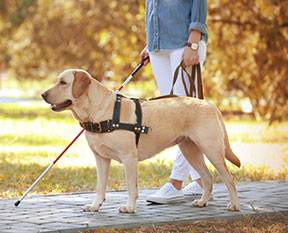by Asim Dietrich, Staff Attorney
Under the Americans with Disabilities Act’s rules for public accommodations and public entities, you and your service animal can go virtually anywhere the public goes—with a few exceptions.
Public accommodations are most places open to the public and operated by private businesses. Public accommodations include private businesses such as restaurants, bars, movie theaters, hotels, grocery stores, retail stores, day care centers, afterschool programs, museums, law offices, health spas, golf courses, food banks, homeless shelters, taxis, healthcare providers and hospitals.
Public entities include the agencies, departments, and special purpose districts of state and local government. Section 504 of the Rehabilitation Act covers federal agencies. Public entities include, for example, government operated schools, colleges, libraries, museums and healthcare facilities as well as welfare, housing, and social service agencies, public services, public transit, and the courts.
Churches, church-run programs, and private clubs are excluded from the ADA’s rules.
The ADA’s rules for public accommodations and public entities (which I will refer to as public places in this post) are the same.
What questions may public places ask me about my service animal(s)?
Public places cannot ask you any questions if it is obvious that you have a disability and your dog or miniature horse is a service animal.
When it is not obvious, public places can only ask two questions about your service animal.
- Whether you need the service animal for a disability; and
- What task your service animal has been trained to do.
Public places cannot ask any specific questions about your disability, and they cannot require that you provide any documentation to prove that your animal is a service animal. Nor can public places ask you to have your service animal demonstrate the task that the animal has been trained to do. Public places may not exclude your service animal solely because it does not wear a vest or tag or has a service animal certification.
When may public places exclude my service animal(s)?
As the U.S. Department of Justice (DOJ) stated, public places can only exclude a particular service animal for the following reasons:
- Your service animal behaves in a way that poses a direct threat to the health or safety of others;
- Your service animal has a history of that kind of behavior;
- Your service animal is not under your control; or
- Your service animal is not housebroken.
Even if a public accommodation excludes a service animal under one of these criteria, it is still required to allow you to return when you are not accompanied by the service animal(s).
There will be a few public places that may exclude all services animals because to allow them would fundamentally alter the service(s) provided, such as a wild animal park or a burn unit in a hospital.
What kind of control do I need to maintain over my service animal?
As the DOJ explains, the general rule is that service animal must be harnessed, leashed, or tethered while in public places unless these devices interfere with the service animal’s work or your disability prevents use of these devices. Then, voice, signal, click, or other effective control is acceptable. The DOJ offers this as an example when a service animal may be off its leash. A returning veteran who has PTSD and difficulty entering unfamiliar spaces may have a service dog that is trained to enter a space, check to see that no threats are there, and come back and signal that it is safe to enter. The dog must be off leash to do its job but leashed at other times. The dog must also be under the control of the handler, even if it is voice control.
Under control also means that a service animal should not be allowed to bark repeatedly in a lecture hall, theater, library, or other quiet place. When a service animal barks just a few time, especially when performing duties, this would not mean that the dog is out of control.
What about my service animal in training?
While the ADA does not extend its protections to individuals with disabilities with service animals in training, an Arizona law makes it a misdemeanor to deny access to an individual with a service animal in training that is under the handler’s control.
Pop Quiz: You plan to run errands tomorrow and intend to take your service animal to the following locations: the grocery store, the bank, the pharmacy, the county recorder’s office, and the movie theater. You will take the city bus to the errands and an Uber home from the movies. Which places, if any, may lawfully deny your service animal entrance? Answer: None of the above.
For answers to other questions about the rights of people with disabilities who have service animals in public places, read DOJ’s Frequently Asked Question Guide.
Do you believe a public place has violated your rights because you have a service animal?
Check out how to file an ADA complaint and how to initiate an Arizonans with Disabilities Act complaint. Call the ACDL for help.


0 Comments